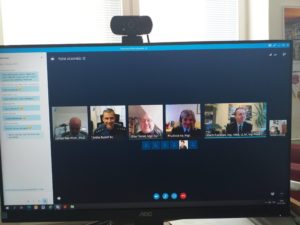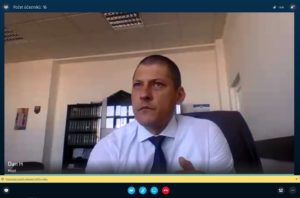 European Penitentiary
European Penitentiary Training Academies Network
Six Czechs and six participants from six different countries are getting ready for the next International English Webinar. The main topic is „Leadership in Crisis“. The facilitator is a former prison governor from Lower Saxony Rüdiger Wohlgemuth.
The number of applicants from abroad has reached over 20 but to make the online interaction effective, only six can be accepted. The professionals who want to practice their communication skills in English and to share their ideas and experience with the six Czech professionals represent prison systems of Bulgaria, Estonia, France, Lithuania, Latvia and Slovakia.
They all have individually tested the connection on the Skype for Business platform successfully. At the same time they proved their communication skills levels are adequate for the discussions. They have sent their BIOs to the facilitator to safe the time they would need to introduce to the other participants during the webinar. The facilitator has asked all participants to fulfil a few pre-tasks before the webinar.
The programme is divided into four blocks:
The Czech Prison Service Academy is planning to organize a few more webinars by the end of 2021.
The facilitators will be foreign experts on management, professional communication or psychology.
Professionals interesting in participation are asked to contact Iva Prudlová iprudlova@avs.justice.cz



You are invited to read the feedback shared by the participants, the facilitator and the observer of the first webinar held on 3rd March 2021.
Click here to read the feedback from participants.
Notes by Dan Halchin, Romania
Dan Halchin was the facilitator of the first webinar. He was asked to write his feedback:
It was a unique and a great experience to deliver the leadership webinar, with an audience eager to find out as much as possible on the topic. The distinction between leadership and management mentioned in the beginning of the webinar was well appreciated. Emphasizing that leadership has in its center the PEOPLE, real human beings with feelings, fears and expectations, in contrast to management which deals with soulless entities called OBJECTIVES, was acknowledged by everyone. Further, the attendees’ interest was focused on finding the less obvious reasons on what works in leading people through time of crisis. Pertinent questions were raised about what might be important in the times of pandemic situation we are facing now. The case study presented in the second part of the seminar was also of great interest. Working single or in small groups, the attendees shared their opinion on the imaginative prison director´s character and his leadership skills.
As an overall personal opinion, the training module was a success, as the opinions exchange was not constrained by formalism, and the interest in the topic was genuine. Not many suggestions for improvement can be done, except maybe planning for additional time to cover all the questions anyone might have. Great appreciation to the Czech Prison Service Academy for making the seminar possible, especially to Capt. Iva Prudlová whose tenacity incapacitating the interest and the resources brought the necessary energy to this success.
Notes by Rüdiger Wohlgemuth, Lower Saxony
An experienced prison director Rüdiger Wohlgemuth is going to be the facilitator of the second webinar. He was taking the role of an observer during the first webinar. He shares his feedback with the readers.
The experience with the first webinar has shown that the participants, the lecturer, and the guests could communicate properly and explain their positions, experiences, and views. Even if some expressions might not be according to English grammar, everybody seemed to understand and able to make his/her point. Moreover, training progress happens while we speak and listen together. It makes me somehow happy to speak with competent colleagues in a foreign language.
Our Romanian colleague Dan Halchin clarified the four things leadership is all about right from the start: Provide a feeling of safety; Speak in a constructive manner; Inspire people to treat their work as an art; Deal with everyday conflicts. Each of the participants agreed to these attitudes and described their experiences with them. The following seminars should allow each participant to explain in more detail how he or she can best combine these virtues with the characteristics of his or her personality and spread them in the staffs
Leadership grows with the internalization of attitudes in harmony with the culture of the institution. This growth process requires a self-critical reflection. Each participant should write down their efforts, successes, and mistakes. The reports should be the material for a professional individual or joint-supervision.


Supported by the Justice Programme of the European Union